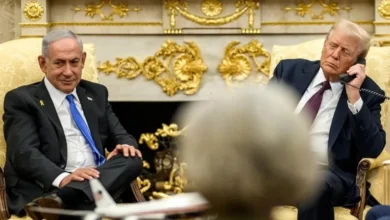Under “Peace Council” leadership, “Jita” plan to govern Gaza revealed
Al-Khamisa News Network - Gaza

A leaked document revealed a plan to govern the Gaza Strip through what is called a “Peace Council” after the implementation of a U.S. initiative aimed at a ceasefire and the release of hostages.
The document, stamped “top secret” and published by the Australian Broadcasting Corporation on Thursday morning, outlined a “possible structure for the so‑called ‘Gaza International Transitional Authority’ (GITA), which could take temporary control of the Strip after the end of the war.”
The Australian broadcaster said it obtained the document from a source who asked to remain anonymous.
The document attributes the drafting of the proposal to the “Tony Blair Institute for Global Change,” a think tank chaired by the former British prime minister.
The “recently updated” data revealed the document’s partial involvement in preparing U.S. President Donald Trump’s 20‑point plan for the Gaza Strip.
Hierarchical structure led by an international council
Under the plan, “GITA” or the “Peace Council” would consist of a hierarchical structure led by an international council that “exercises overarching strategic and political authority,” and a chair who would lead the entire operation as the “senior political executive.”
The project also includes the creation of an authority tasked with managing investment projects, including infrastructure and “housing projects.”
While Trump’s plan for Gaza did not name the “GITA” explicitly, it said: “If the war ends, Gaza will be governed by a temporary transitional committee overseen by an international transitional body called the (Peace Council).”
According to the document, GITA would be headed by a council of seven to ten members, including “prominent international figures with executive and financial experience.”
Among the potential names for board members suggested in the plan were the Egyptian billionaire Naguib and his American counterpart Marc Rowan, a private equity investor.
The document hinted that Rabbi Arieh Lightstone, chief executive of the “Abraham Institute for Peace,” might also receive a seat on the proposed entity’s board.
The Australian broadcaster’s report said that “the individuals named in the document were not aware that their names might be circulated in this way publicly.”
A Palestinian representative from business or security
The project calls for the inclusion of “at least one Palestinian representative on the council,” provided that the person is “qualified.” The document did not specify the required qualifications, but it suggested the Palestinian representative could come “from the business sector or security.”
As for the chair of the committee, they would have an “integrated” team of 25 people, according to the document. The composition also includes a “dedicated security force to protect the senior leadership of ‘GITA.'”
Under the board’s leadership, five commissioners would oversee five major areas: humanitarian affairs, reconstruction, legal and legislative affairs, security oversight, and coordination with the Palestinian Authority.
The duties of GITA’s security force would include deterring “the re-emergence of armed groups, protecting humanitarian operations and reconstruction,” as well as being responsible for counterterrorism and dealing with high‑risk threats.
The document contains a complex diagram showing the nature of coordination between GITA’s leadership and its subordinate bodies, including the Palestinian Authority, which sits below the entity’s hierarchy and is limited to “providing services,” led by an executive appointed by the international board.
Rebuilding the healthcare system
The responsibilities of GITA’s executive authority include rebuilding Gaza’s destroyed healthcare system, including “hospitals, primary care clinics, vaccination programs and emergency response units.”
The interim government would also be responsible for operating the education system, rebuilding vital infrastructure, and all forms of conventional governance including the judiciary and the “civil police force in Gaza.”
Under the project, the police force would report to the Palestinian executive authority; its responsibilities would include day‑to‑day policing, crime prevention, and coordination with Israeli security forces.
The draft document also proposes the creation of an authority to “promote investment and economic development in Gaza,” whose tasks would center on “launching bankable projects with real financial returns” that would “attract private capital,” as well as “managing investment portfolios and providing significant facilities for investors.”
The GITA “Grants and Financial Accountability Facility” would be responsible for “receiving, safeguarding and distributing all contributions based on international grants.”
US$388 million — operating cost of the project
According to the proposed budget, the operating cost of the GITA project would be about US$388 million during the first three years; US$27 million is allocated for the board alone.
While the leaked document outlines a three‑year framework, it did not envision Gaza’s reality after that period and did not set a timetable for handing administration back to the Palestinian Authority.
Related news
The document indicates that Gaza could be governed, at least temporarily, from remote centers in Egypt and Jordan.
The Australian broadcaster quoted John Naeem Sanobar, a former diplomat in Egypt and Pakistan and a Palestinian Christian, as saying that “the people sitting around the GITA table are driven by capital interests,” in his words.
He added: “Trade and investment in Gaza is positive,” but questioned: “Who is looking after Palestinian interests in this scenario?”





